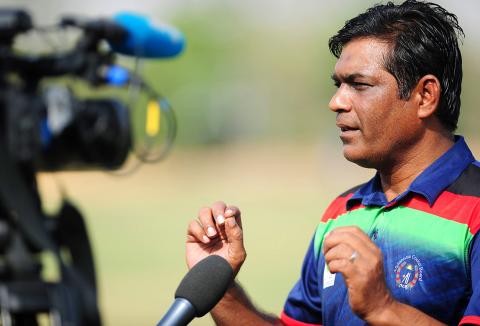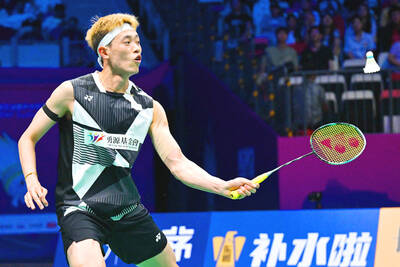The story of Afghanistan’s rise in cricket has been nothing short of a fairytale, but the real work will begin only after their debut in next year’s World Cup, according to Rashid Latif, the ex-Pakistan skipper who is a coach with the Afghan team.
Latif has been charged with helping the Afghans prepare for the tournament at a training camp in Karachi, a role he is reprising after previously leading the team to a silver at the 2010 Asian Games.
Afghanistan’s rapid ascent from the fifth division of world cricket in 2008 to qualifying for next year’s showpiece event in Australia and New Zealand has been hailed as one of the sport’s biggest success stories.

Photo: AFP
The tale is made poignant by the country’s war-torn history, with many Afghans first exposed to cricket in Pakistani refugee camps during the Soviet occupation in the 1980s.
Sport was largely stifled under the isolated Taliban regime that ruled from 1996 to 2001, and cricket took off after it was overthrown.
Latif said the team needs to stay focused on their long-term development to avoid the fate of other up-and-comers.
“I don’t want them to go down after ascending, like Kenya,” he said of the nation which reached the semi-final of the 2003 World Cup, but later fell away, losing its right to play one-day internationals.
“I hope the World Cup is not a make-or-break for Afghanistan,” the former wicketkeeper said. “Their real cricket will start after the World Cup.”
He added the Afghans could prove to be formidable opponents against top teams “in the next five years.”
In 1999, Bangladesh made their World Cup debut, at which they famously beat Pakistan.
They attained Test status the following year only to remain cricket’s whipping boys since then.
Latif said beating Bangladesh when they meet in their opening World Cup group match was a real prospect.
“For me they should target Bangladesh and another qualifier team, but play in a manner that if kids are watching on television back home they can feel proud of them,” he said.
For team manager Shafiq Stanikzai, cricket is an important unifier for Afghanistan that cuts across divides in a country long riven by ethnic rivalries and still struggling to bring peace after decades of war.
“Cricket is responsible for bringing the youngsters towards sport and sport means peace — and that’s what the bigger picture is,” he said. “Unity is the core element of this team, and the reason behind our success is unity and teamwork.”
Afghanistan have featured in three World Twenty20 events since 2010, but qualifying for the more prestigious 50-over World Cup is their biggest sporting achievement to date.
The Sharjah qualifier in October last year came a month after a soccer victory over India in the South Asian Football Federation Cup, another high.
Regular coach Kabir Khan, an ethnic Pashtun who played four Tests and 10 one-dayers for Pakistan in the 1990s, said that both of the achievements showed the country’s potential and that success in one sport had a ripple effect.
“I will say that cricket is responsible for all this, if one sport is doing well the others follow,” he said.
Latif says the harsh conditions the Afghan players faced in their own lives meant they had what it took to handle the pressures of the top-flight.
“They are mentally tough and well built too. As a coach, I came to teach, but I have learnt from them,” he said. “They get their mental toughness because when they were in camps they had to fight just to eat.”

Inter’s defense of their Italian Serie A title was hit with a setback on Sunday as they lost 1-0 at home to AS Roma, while Scott McTominay netted a brace as SSC Napoli beat Torino 2-0 to go top of the table. No fixtures were played on Friday or Saturday because of the funeral of Pope Francis in Rome, meaning the full round of Serie A matches took place on Sunday and yesterday. Matias Soule’s first-half strike for Roma knocked Inter off top spot earlier in the day before new Napoli opened up a three-point buffer with victory in Sunday’s

FOCUS: ‘We came out here with a goal in mind ... to keep our foot on their throat and on their neck, and continue to play 48 minutes of basketball,’ Donovan Mitchell said The Cleveland Cavaliers on Monday thrashed the Miami Heat to cruise into the next round of the NBA playoffs as the Golden State Warriors battled past the Houston Rockets 109-106 to move to the brink of a series victory. After pounding Miami 124-87 in game three on Saturday, No.1 Eastern Conference seeds Cleveland once again piled on the misery for their outclassed opponents with a crushing 138-83 victory to complete a 4-0 series win. The 55-point drubbing was the largest series-clinching victory in NBA playoff history and sets up a series against either the Indiana Pacers or Milwaukee Bucks in

Freddie Freeman homered and drove in four runs, Shohei Ohtani also went deep and Roki Sasaki earned his first major league win as the Los Angeles Dodgers beat the Atlanta Braves 10-3 on Saturday night for their seventh straight victory. The Dodgers have won the first two games of the series to improve to 5-0 against Atlanta this year. Los Angeles’ three-game sweep at home early in the season left the Braves 0-7. Sasaki allowed three runs and six hits over five innings. The 23-year-old right-hander gave up a home run to Ozzie Albies, but received plenty of offensive support in his

Shuttler Lin Chun-yi yesterday kept Taiwan on the board as they faced their first major challenge of the group stage after marching into the last eight at the Sudirman Cup Finals in Xiamen, China. Taiwan were losing 3-1 to South Korea as of press time last night, with only the men’s doubles match remaining. Taiwan and four-time champions South Korea have already progressed to the quarter-finals, after Taiwan on Monday blanked the Czech Republic 5-0 without giving up a single game. Before last night’s tie, Taiwan were undefeated in Group B, with a 9-1 match record, ahead of South Korea, who, although also